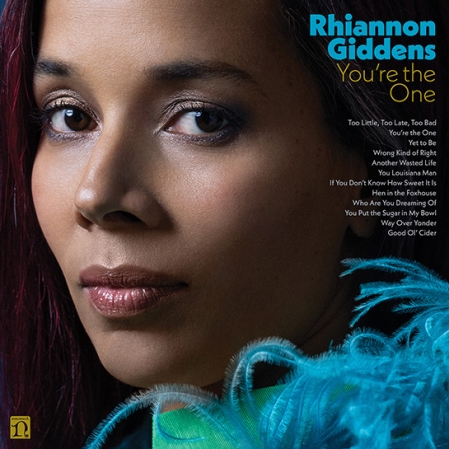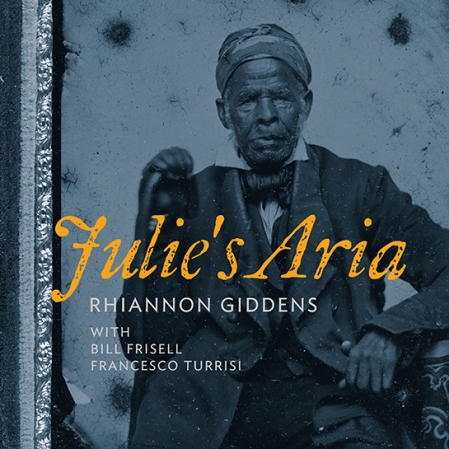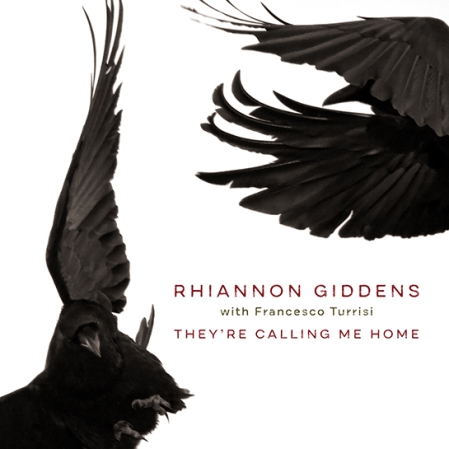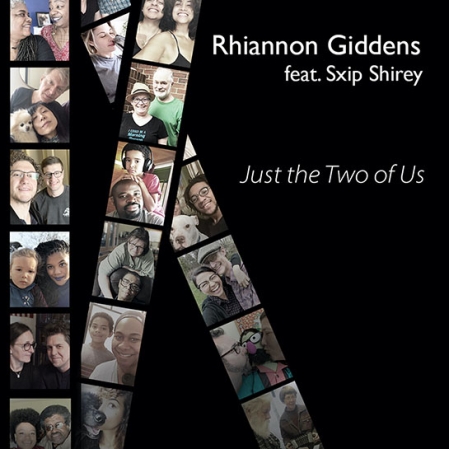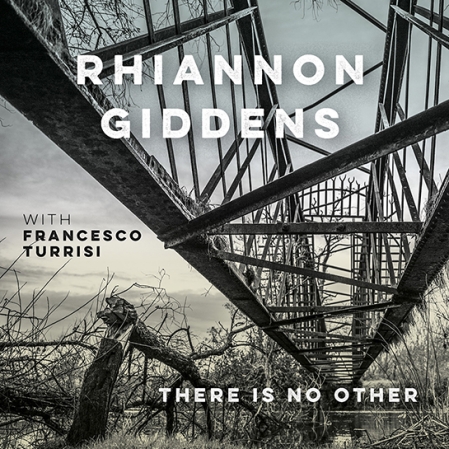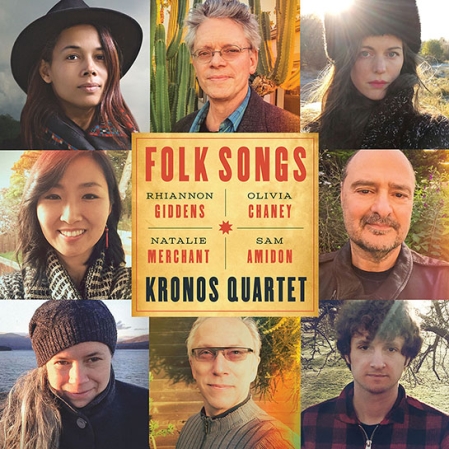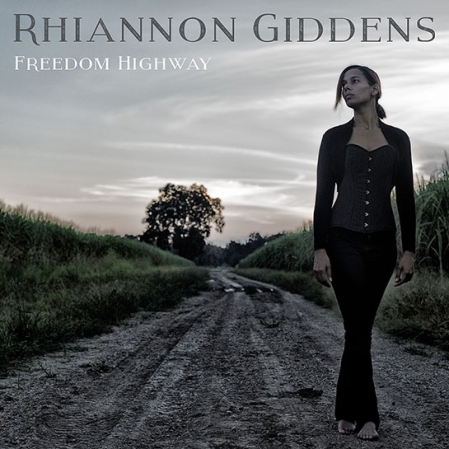Rhiannon Giddens reunites with her former Carolina Chocolate Drops bandmate Justin Robinson on What Did the Blackbird Say to the Crow. Produced by Giddens and Joseph "joebass" DeJarnette, the album features Giddens on banjo and Robinson on fiddle, playing eighteen of their favorite North Carolina tunes. Many were learned from their late mentor, legendary North Carolina Piedmont musician Joe Thompson; one is from another musical hero, the late Etta Baker. Giddens and Robinson recorded outdoors at Thompson’s and Baker’s North Carolina homes, as well as the former plantation Mill Prong House, accompanied by the sounds of nature, including two different broods of cicadas, which had not emerged simultaneously since 1803, creating a true once-in-a-lifetime soundscape.
Rhiannon Giddens reunites with her former Carolina Chocolate Drops bandmate Justin Robinson on What Did the Blackbird Say to the Crow, an album of North Carolina fiddle and banjo music, out April 18 on Nonesuch Records. Produced by Giddens and Joseph "joebass" DeJarnette, the album features Giddens on banjo and Robinson on fiddle, with the duo playing eighteen of their favorite North Carolina tunes: a mix of instrumentals and tunes with words. Many were learned from their late mentor, the legendary North Carolina Piedmont musician Joe Thompson; one is from another musical hero, the late Etta Baker, from whom they also learned by listening to recordings of her playing. Giddens and Robinson recorded outdoors at Thompson’s and Baker’s North Carolina homes, as well as the former plantation Mill Prong House. They were accompanied by the sounds of nature, including two different broods of cicadas, which had not emerged simultaneously since 1803, creating a true once-in-a-lifetime soundscape. A video of “Hook and Line,” a traditional tune from Joe Thompson’s repertoire and filmed at his home in Mebane, NC, may be seen below. It is the first tune Thompson ever learned; Giddens and Robinson continued the legacy by learning it from him.
“With the assaults on reality going on in the world today, we wanted to offer another kind of record, like walking back onto a gravel or dirt road while a stampede goes the other way,” Giddens says. “With the cicada choir, this record could’ve only happened at a certain time in the last 120 years. We doubled down on place, time, realness, and old-fashioned front porch music. It’s a reminder that another way exists, with music made for your community’s enjoyment and for dancing–not solely for commercial purposes.
“What is the role of music in our society?” she wonders. “How do we de-couple it from unfettered capitalism, where music is a product and musicians are incidental? How do we use the tools and system that we have been bequeathed in a way that reminds us of other ways of being?”
Robinson adds, "Recording this album felt like being back in the saddle. Just this time Joe is not here, and his fiddle is under my chin. The album is about home, the cicadas, the storms, the music, and the people who make it feel like home."
Thompson was one of the last musicians of his era and his community to carry on the southern Black string band tradition. He played a crucial role in the lives of Giddens and Robinson, who, along with their Carolina Chocolate Drops bandmate Dom Flemons, spent their formative years learning from Thompson in traditional apprentice/mentor relationships. His influence has guided all of their artistic journeys as well as their mission to keep the legacy of the Black string band tradition alive.
Made in 2024, What Did the Blackbird Say to the Crow was recorded in outdoor settings with just Giddens and Robinson, a couple of folding chairs, and some microphones–one of which was placed to pick up the sounds of nature around them, “using technology in the way that we choose,” as Giddens says. While at Thompson’s house, his nephew brought out one of his uncle’s restored fiddles–which Robinson played on the recording. In a recording process full of similar bits of kismet, they experienced another magical moment at Baker’s Morganton, NC home, when Baker’s son offhandedly mentioned that his mother had recorded “Carolina Breakdown” in her yard, and that a Carolina wren ended up on the recording. Robinson and Giddens were delighted to hear him tell this story, as that very recording had been their inspiration to make What Did the Blackbird Say to the Crow the way they did. The duo recorded Baker’s version of “Marching Jaybird” in that same yard, with Baker’s son listening.
In further tribute to Giddens’ North Carolina roots, What Did the Blackbird Say to the Crow will arrive just a week before Biscuits & Banjos, the inaugural edition of her first festival. Taking place April 25–27 in downtown Durham and curated by Giddens, Biscuits & Banjos highlights the deep roots and enduring legacy of Black music, art, and culture while fostering community and storytelling. The sold-out festival will feature a much-anticipated Carolina Chocolate Drops reunion, their first performance together in more than a decade. Additional performers include Taj Mahal, Leyla McCalla, Adia Victoria, Don Vappie & Jazz Creole, Infinity Song, Toshi Reagon, and many others, alongside speakers such as Alice Randall, Caroline Randall Williams, and Dr. Dena Ross Jennings. Workshops, square dances, free banjo lessons, and a celebrity chef biscuit bake-off will also be featured.
Rhiannon Giddens has made a singular, iconic career out of stretching her brand of folk music, with its miles-deep historical roots and contemporary sensibilities, into just about every field imaginable. A two-time GRAMMY Award–winning singer and instrumentalist, 2023 Pulitzer Prize winner, MacArthur “Genius” grant recipient, and composer of opera, ballet, and film, Giddens has centered her work around the mission of lifting up people whose contributions to American musical history have previously been overlooked or erased, and advocating for a more accurate understanding of the country’s musical origins through art. Her most recent release is 2023’s You’re the One, Giddens’ first album of all original songs; her banjo can be heard on the history-making song “Texas Hold ‘Em”; and she is the Artistic Director of Silkroad Ensemble. In addition to her musical pursuits, Giddens has published two children’s books featuring her lyrics, hosts the Aria Code podcast on WQXR, and has composed music for ballet and film, and two of her songs are featured in the hit video game Red Dead Redemption 2.
Justin Robinson is a GRAMMY Award–winning musician and vocalist, cultural preservationist, and historic foodways expert. Robinson has used his wide range of interests and talents to preserve North Carolina’s African American history and culture, connecting people to the past and to the world around them.
Robinson grew up exploring the woods and rivers around him in Gastonia, NC. Influenced by the musical tastes of his grandparents, he grew to love a diversity of musical styles. He learned to play the violin as a child; however, he did not enjoy playing classical music and stopped around the age of thirteen. It wasn’t until he was inspired by the old-time blues jams he attended as a student at UNC-Chapel Hill that he decided to approach the violin again—this time, as a fiddler. He played with the Carolina Chocolate Drops, working to preserve traditional forms of music, to introduce new generations to musical legends like Joe Thompson, and to remind audiences that the fiddle was, historically, an African American instrument. He wrote the song “Kissin’ and Cussin’” for the group’s GRAMMY Award–winning album, Genuine Negro Jig, and continued to write music after leaving the group in 2011, releasing the album Bones for Tinder as Justin Robinson and the Mary Annettes in 2012.
In addition to preserving African American musical traditions, Robinson is known for his work as a culinary historian. He is an eighth generation Afro-Carolinian and is the descendant of sharecroppers and large landowners. He is constantly exploring the complex relationship that people have with our plant relatives, including through his social media account, @CountryGentlemanCooks, and through the formation of the Earthseed Land Cooperative, a collective in northern Durham “made up of farmers, entrepreneurs, professionals, and teachers who are currently engaged in creating alternative models for sustainability, equity, and cooperation within communities of color.”
Robinson has a Master of Science degree in Forestry from North Carolina State University and carries on the ethnobotany work of his grandfather, J.G. Johnson.
PRODUCTION CREDITS
Produced by Rhiannon Giddens and Joseph "joebass" DeJarnette
Executive Producer: David Bither
Engineered by Joseph "joebass" DeJarnette
Recorded on location at Etta Baker’s house in Morganton, NC, at the Mill Prong House & Preservation in Red Springs, NC, and at Joe Thompson’s house in Mebane, NC May 9-11, 2024
Mixed at Studio808A, Floyd, VA by Joseph "joebass" DeJarnette
Mastered by Amy Dragon at Telegraph, Portland, Oregon
All songs are traditional. Tracks 1,3 4, 10, 12, 13 arranged by Joe Thompson. All other tracks arranged by Justin Robinson and Rhiannon Giddens
Design by Jeri Heiden for SMOG Design, Inc.
Photography by Karen Cox
MUSICIANS
Rhiannon Giddens, banjo (1-4, 6-13, 15), minstrel banjo (5, 14), vocals (11-12)
Justin Robinson, fiddle (1-16, 18), vocals (1, 3, 7, 11-13, 15-16), banjo (17)
Justin “Demeanor” Harrington, bones (1, 10)







